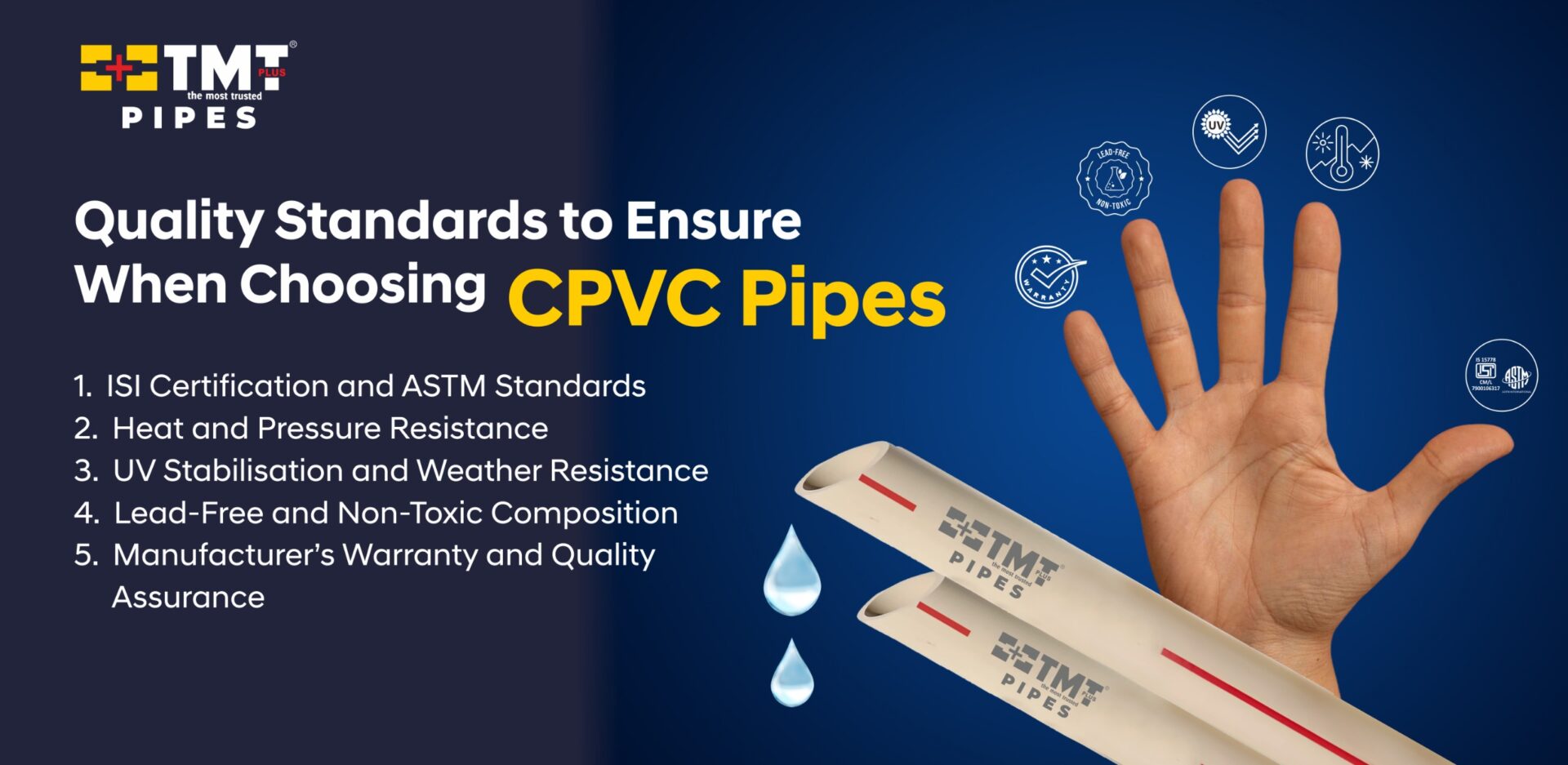 CPVC pipes are a chlorinated version of PVC pipes. These pipes have become a preferred choice for plumbing needs because they can handle higher temperature resistance. Beyond that, their other features, like corrosion resistance, low thermal conductivity, etc., make them more durable and cost-effective, allowing them to deliver optimal performance for years to come.
CPVC pipes are a chlorinated version of PVC pipes. These pipes have become a preferred choice for plumbing needs because they can handle higher temperature resistance. Beyond that, their other features, like corrosion resistance, low thermal conductivity, etc., make them more durable and cost-effective, allowing them to deliver optimal performance for years to come.However, with numerous brands on the market, it is very easy to overlook the quality of the pipe in favour of price. Some people might buy lower-quality pipes, but that will directly affect their durability, safety and overall performance.
If you are planning to buy CPVC pipes for residential, commercial or industrial projects, here are a few must-check quality checks that you must ensure before you make a purchase.
5 Must-Check Quality Standards
1. ISI Certification and ASTM Standards
Always ensure that the CPVC pipes you choose are ISI certified and conform to ASTM standards, particularly ASTM D2846 for hot and cold water plumbing. These certifications ensure the pipes meet the necessary safety, durability, and performance benchmarks. Pipes without such markings might be prone to failure or substandard performance. Proper certification is a clear indicator that the product has undergone rigorous quality testing and is compliant with national or international guidelines.
2. Heat and Pressure Resistance
CPVC pipes should be able to withstand high temperatures and pressure, especially in hot water supply lines. Check for pipes rated up to 93°C (200°F), which indicates good thermal stability. Also, verify the pipe’s pressure class, which is usually printed on the pipe itself. This helps ensure the piping can handle the pressure requirements of your application without deformation, warping, or bursting, making it suitable for both domestic and industrial systems.
3. UV Stabilisation and Weather Resistance
If your CPVC pipes are to be installed outdoors or in areas exposed to sunlight, UV resistance is essential. Quality CPVC pipes are UV-stabilised to prevent brittleness, cracking, or colour fading caused by prolonged exposure. Lack of proper stabilisation can lead to pipe degradation over time. Weather-resistant properties add another layer of durability, ensuring the pipes retain their strength and integrity in varied climate conditions, which is critical for long-term performance.
4. Lead-Free and Non-Toxic Composition
Health and safety should never be compromised. Make sure the CPVC pipes you choose are lead-free and made from non-toxic materials, particularly for plumbing systems that carry drinking water. Pipes that comply with NSF/ANSI 61 standards are safe for potable water. Choosing lead-free CPVC pipes not only ensures water purity but also aligns with eco-friendly practices, making them suitable for both residential and commercial plumbing networks.
5. Manufacturer’s Warranty and Quality Assurance
A reliable warranty is a sign of the manufacturer’s confidence in their product. Look for CPVC pipes from reputable manufacturers like TMT Plus that come with a written warranty covering material defects and performance issues. Also, check if the brand follows stringent in-house quality control procedures and batch testing. A transparent warranty policy, combined with a trusted brand reputation, acts as a safeguard for your plumbing investment and helps avoid unexpected failures and repair costs.
What Makes CPVC Pipes a Preferred Choice?
Heat Tolerance
CPVC pipe fittings are manufactured to work at high temperatures of 93°C, making them viable for hot water plumbing in homes and commercial settings. Their thermal stability means they will last in hot water applications without bending or sagging or, worse, assuring demanding applications.
Corrosion Resistance
Unlike metal pipes, CPVC pipes will not corrode, rust or scale over time. CPVC pipes are completely unaffected by aggressive water and most household chemicals, providing a clean and smooth flow of water. The corrosion resistance is even longer-lasting and more maintenance-free than metal pipes, which will elongate the life of plumbing systems exposed to extreme and varied conditions.
Smooth Internal Surface
CPVC pipes have a very smooth inner surface, which minimises friction to reduce pressure drops throughout the plumbing system. The smooth inner surface allows water to flow with less resistance, minimising the chances of internal build-up of debris or minerals and increasing efficiency.
Lightweight and Easy to Install
CPVC pipes are considerably lighter than metal pipes, making them much easier to transport and install. They can be cut and connected with simple tools and with solvent cement, which saves installation time and saves on labour. They are so easy to use for plumbing; they are ideal for plumbing that is quick, easy, and money-saving.
Long-Term Durability
CPVC plumbing pipes exhibit far greater resistance to degradation, wear, and environmental stress. CPVC maintains strength and performance for decades under the toughest conditions. The extended life of these incredibly durable pipes leads to fewer replacements, repairs and downtime, giving you one of the best values in both residential and commercial plumbing.
Low Thermal Conductivity
CPVC plumbing pipes are designed with low thermal conductivity that minimises heat loss while delivering hot water. This means the temperature of the water is better maintained as it is delivered to the user point. You will be able to effectively produce more energy efficiency and less condensation on the outside due to these factors. This is especially useful in buildings targeting more energy-efficient plumbing systems with operational savings.
Choosing a CPVC pipe based solely on the appearance or price will certainly lead to long-term plumbing issues. Ensuring the quality checks while buying the pipes will help you make sure that the pipes are a great investment for years to come. When you prioritise quality, you guarantee safety, durability and optimal performance for years to come.



